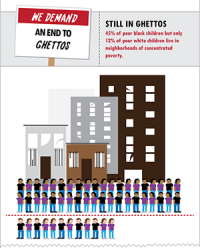
On August 28, 1963, more than 250,000 people participated in the March on Washington for Jobs and Freedom.
They marched for equal access to public accommodations, voting rights, and the end of racial discrimination in employment. While achieving the full measure of these rights remains a work-in-progress, legislative and policy commitments to these goals were secured. But the marchers also demanded:
- decent housing
- adequate and integrated education
- jobs for all
- a minimum wage worth more than $13 an hour today
Fifty years later, on all socioeconomic measures, African Americans still lag whites by wide margins. At the same time, economic opportunities are shrinking for working people of all races. Until we achieve all of the march’s goals, there is little hope for reducing black-white socioeconomic disparities and providing genuine opportunity for economic advancement to all Americans.
Infographic
Reports
An Introduction | Thomas J. Sugrue
A National Living Wage | Sylvia Allegretto and Steven Pitts
Adequate and Integrated Education | Richard Rothstein
The Right to Vote | Barbara Arnwine
A Federal Jobs Program | William Spriggs
Symposium
On Monday, July 22, 2013, some of the nation’s foremost thinkers on race and economics were brought together by the Economic Policy Institute to discuss how to achieve these economic goals, including decent housing, adequate and integrated education, jobs for all, and a living wage at a symposium called The Unfinished March.
A full audio/video recording of the event is available on C-SPAN.
[new_royalslider id=”1″]
Photos by Judy Licht
Press Releases
Hard economic tasks of the march remain a distant dream
Upcoming EPI Symposium on the Unmet Economic Goals of the Civil Rights Movement
